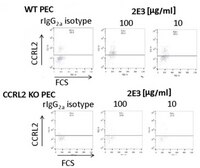MABF1033 Sigma-AldrichAnti-CCRL2 (Mouse) Antibody, clone BZ2E3
This rat monoclonal Anti-CCRL2 (Mouse) Antibody, clone BZ2E3, Cat. No. MABF1033, is validated for use in Flow Cytometry for the detection of CCRL2.
More>> This rat monoclonal Anti-CCRL2 (Mouse) Antibody, clone BZ2E3, Cat. No. MABF1033, is validated for use in Flow Cytometry for the detection of CCRL2. Less<<Anti-CCRL2 (Mouse) Antibody, clone BZ2E3 MSDS (material safety data sheet) or SDS, CoA and CoQ, dossiers, brochures and other available documents.
Recommended Products
概述
| Replacement Information |
|---|
重要规格表
| Species Reactivity | Key Applications | Host | Format | Antibody Type |
|---|---|---|---|---|
| M | FC | R | Purified | Monoclonal Antibody |
| References |
|---|
| Product Information | |
|---|---|
| Format | Purified |
| Presentation | Purified rat IgG2a in buffer containing 0.1 M Tris-Glycine (pH 7.4), 150 mM NaCl with 0.05% sodium azide. |
| Quality Level | MQ100 |
| Physicochemical Information |
|---|
| Dimensions |
|---|
| Materials Information |
|---|
| Toxicological Information |
|---|
| Safety Information according to GHS |
|---|
| Safety Information |
|---|
| Storage and Shipping Information | |
|---|---|
| Storage Conditions | Stable for 1 year at 2-8°C from date of receipt. |
| Packaging Information | |
|---|---|
| Material Size | 100 μg |
| Transport Information |
|---|
| Supplemental Information |
|---|
| Specifications |
|---|
| Global Trade Item Number | |
|---|---|
| 产品目录编号 | GTIN |
| MABF1033 | 04054839168727 |
Documentation
Anti-CCRL2 (Mouse) Antibody, clone BZ2E3 MSDS
| 职位 |
|---|
Anti-CCRL2 (Mouse) Antibody, clone BZ2E3 分析证书
| 标题 | 批号 |
|---|---|
| Anti-CCRL2 (Mouse), clone BZ2E3 MONOCLONAL ANTIBODY | Q2819097 |







